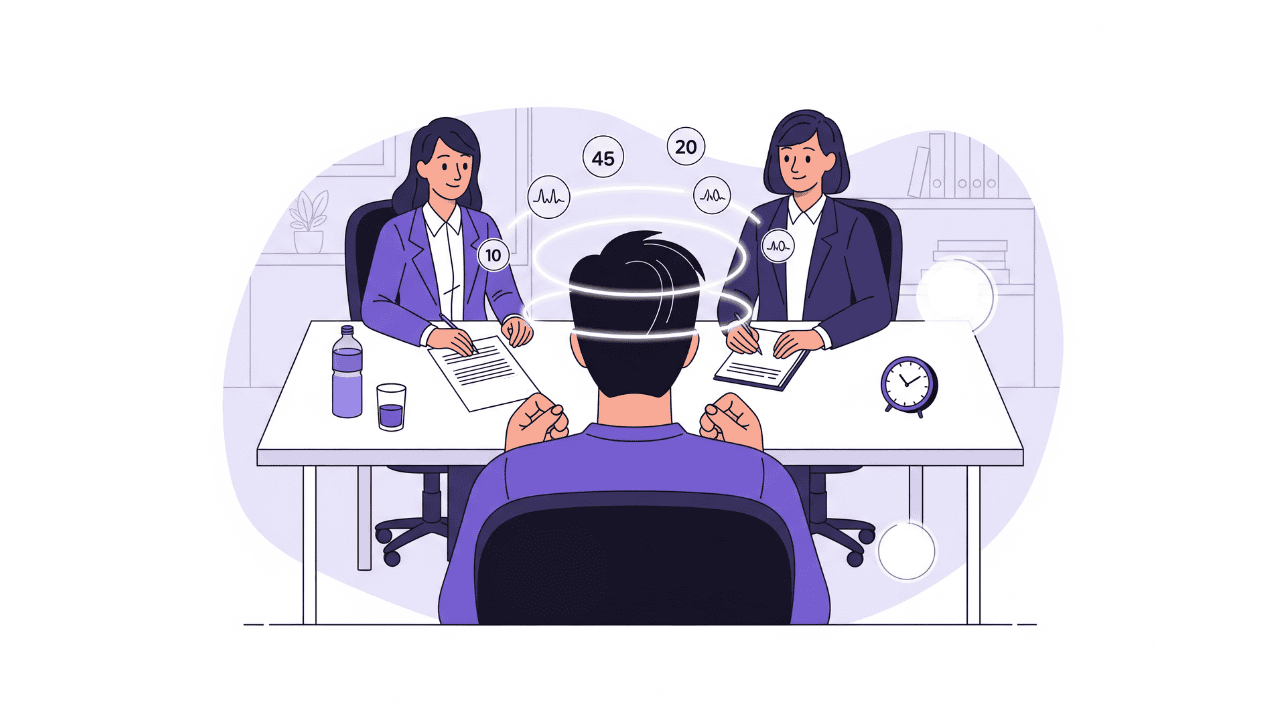You had the interview covered. Until you froze. Here’s what happens
Why do you freeze in interviews? It’s not lack of preparation, it’s your brain’s survival response. Discover the neuroscience behind interview anxiety and a 4-step method to rewire your freeze reflex. Learn science-backed techniques (like the 4-7-8 breathing method and stress exposure training) to stay calm and confident under pressure.
InterviewBuddy - 17 Jun 2025

We have all had that moment. The question lands, Your mouth opens, And… nothing.
Whether it’s a job interview, a university panel, a scholarship jury, or even a conversation where stakes feel high, your brain blanks, and your body tenses up.
In these moments, the advice we are given the most
“Just be confident.” “Practice more.” “Calm down, it’s just a conversation.”
But often miss reflecting on the nervous system controlling the reins.
Freezing Isn’t a Flaw. It’s a Feature.
That blank-out moment? It’s not because you’re underprepared or not good enough. It’s because your_ brain thinks it’s in danger._
In high-pressure moments, the part of your brain responsible for staying alert to threats, “the amygdala” takes over.
It can’t tell the difference between a life-threatening situation and someone asking you, “Tell me about yourself.”
This triggers what’s called an amygdala hijack; your body goes into survival mode, and your thinking brain (the part that stores your well-rehearsed answers) goes offline for a bit.
In short, your body is trying to protect you, just in the worst possible way.
Why Most Advice Fails You
The usual advice assumes your brain is calm.
- Saying “just relax” when your heart is racing doesn’t work.
- Memorising scripts is great until the interviewer interrupts you halfway through.
- Practising in your bedroom doesn’t help if your nervous system has never experienced pressure during practice.
To get better, you don’t need another mock Q&A worksheet. You need to train your brain under conditions that feel real.
So, How Do You Rewire a Freeze Response?
Here’s a simple 4-step approach that works with your biology, not against it:
1. Label It, Don’t Fight It
When the freeze hits, don’t push it away. Say something like: “This is adrenaline. Not failure.” Just naming the emotion helps re-activate your rational brain.
2. Regulate Before You Speak
Use a breathing technique (the 4-7-8 method is gold):
- Inhale for 4 seconds
- Hold for 7
- Exhale for 8
Do this before interviews or, if needed, between questions.
3. Practice With Pressure, Not Perfection
Set up mock situations with timers, interruptions, or awkward silences to simulate real-life scenarios.
- Recording a 60-second answer while your phone buzzes
- Asking a friend to interrupt you mid-sentence
- Switching between formats (video, voice, phone, in-person)
This trains your brain to stay steady, even when things don’t go smoothly.
We run mock interviews at InterviewBuddy with real-time pressure and feedback, so your nervous system learns to stay grounded when it matters most.
4. Drop the Script; Build Story Anchors
Stop memorising word-for-word answers.
Instead, internalise story points: real things you’ve done, challenges you’ve faced, moments that mattered.
So even if a question catches you off guard, you have real material to work with, not lines to recall.
Try This:
- Pick one moment when you froze.
- Write out the answer you wanted to give.
- Record yourself answering it casually.
- Watch the video and just notice: what did your voice, breath, or body do?
- Do two rounds of 4-7-8 breathing.
- Try again, but shorten the time, or answer it on audio instead.
Repeat this cycle until you feel more regulated than rattled.
This is called stress exposure plus recovery, and it’s how people train for public speaking, performance, and even combat.
Freezing Isn’t Failure. It’s Rewiring Waiting to Happen.
Freezing in interviews isn’t a sign that you’re unprepared, it’s a very normal stress response.
The key is to work with your brain and body, not against them. With the right kind of practice that includes pressure, recovery, and real stories, you can build more comfort and confidence over time.
Sources:
Recent blog posts
Tue, 10 Feb 2026
Why Your Job Interview Feels Like a Marathon (and How to Actually Win the Race)
The interview process can feel like running a marathon - long, draining and unpredictable. Learn why the process feels this way and how to pace yourself for success. Ever noticed how job interviews aren't just about the 30-60 minutes you spend answering questions? They stretch out over weeks, sometimes months, testing your patience, endurance and mental strength. Much like a marathon, the interview process isn't a quick sprint; it's a long-distance challenge that requires preparation, pacing and resilience.
Sat, 13 Sep 2025
The Best Interview Questions You Should Ask Employers
You’ve prepared for the interview, practiced your answers, and now it’s time to turn the tables. But what should you ask? Asking questions in an interview isn’t just about gathering information, it’s a chance to show that you’re thoughtful, curious, and genuinely interested in the role and the company. Plus, it helps you figure out if this is the right fit for you. Let’s explore why asking questions matters, which ones to ask, and how to make it feel natural during the interview
Mon, 18 Aug 2025
7 Resume Mistakes That Are Silently Killing Your Chances
75% of resumes fail ATS scans. Learn the 7 resume mistakes silently ruining your chances and how to fix them for recruiter approval and job success.